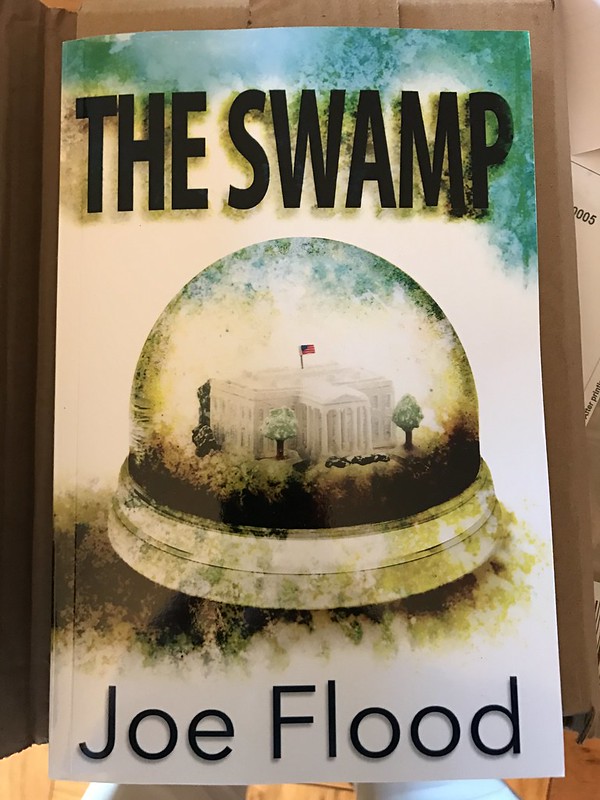
Most Americans voted against Trump. Elected by a disaffected rump of the population, the crass New Yorker governed like a tyrant, his models being Putin, Erdogan and Chavez. The country was saved solely by the incompetence of the man, who turned out to be more Mussolini than Der Fuhrer.
Still, 2017 was a deeply traumatic year, where the infection of politics found everyone, even those who sought to avoid it, like myself, naively thinking that I could ignore the new President as helicopters whirred overhead on Inauguration Day.
That was the moment I was radicalized, hearing Trump speak of American carnage while I watched real carnage on the streets of DC. I spent my life avoiding politics in Washington, feeling it to be a pointless exercise. Yet, by the end of the year, it seemed essential that every American, including me, resist incipient tyranny.

Ironically, a few weeks earlier, I was sympathetic to Trump voters, representing my beliefs in the short story Victory Party, which won the City Paper fiction competition. Yet, after my reading at Kramerbooks (the highlight of the year for me), events pushed me left.
My journey, and the journey of millions like me, was summed up in a tweet:
Running was a consolation, even in mid-winter, pounding around the monuments useful stress relief. I aimed for 300 miles this year. Not much for some, but more than I’ve ever run, and nearly got there except for injury.

In March, cherry blossoms bloomed and then were covered in snow – it was that kind of year. By then, protests had filled the streets for months, from the comedic geekery of March for Science to the staggering crowds of the Women’s March, every one of them exponentially larger than the paucity of people that greeted the Donald to DC.
The year saw me increasingly politicized, especially after witnessing the heartless attitudes of Trump tourists toward refugees and visiting a South clinging to Civil War memories. The eclipse brought the country together, but only briefly.

Meanwhile, I was thinking of The Swamp, doing some freelance work while I hammered my comic novel into place. Originally titled Drone City, and about 90% done at the start of the year, I revised it extensively for an era that was stranger than fiction, my selection of the title a clapback at the Trumpkins who think America can survive without a government. In my book, I gave them their wish.
My books are a cynical look at DC, while my photography is a romantic vision of the city. I like wandering the streets and taking photos, even in the snow, like the shot of the Spanish Steps which won the Mitchell Park Photo Competition and admission to the French Ambassador’s residence, a fancy event I attended in a ripped jacket.
A better fit for me was the wonderful Community Collective show, square views of the city curated by friends of mine. In addition to being the unofficial photographer of #BikeDC, I was also a Brand Ambassador for Enterprise CarShare and took trips to Gettysburg and Little Washington.
2017 was the year that money seemed to slosh through the economy, just out of reach for real people, but readily available for questionable notions like coworking and dockless bikesharing.

Some of that free stuff found its way to me. I got to sample Uncle Nearest, the bourbon with a fascinating backstory. My bike dreams came true with a Brompton for a day. Through my friends at InstagramDC, I got to experience the interactive art of Artechouse.
But this was the year that America, and its Baby Boomer overlords, said, “Fuck it. We’re not even going to try anymore.” Their parents won a war, built infrastructure and sent a man to the Moon. Boomers spent money on themselves as America fell apart around them. I asked, Does Anybody Make Real Shit Anymore?
I won’t blame Boomers for one loathsome plague: brunch. Sloppy, gross and everywhere, it defined the horror show of America, 2017 edition. One of my last memories of the year was waiting for a friend to finish brunch (I refused to go) while Millennials arrived by Uber and were removed by ambulance, unable to handle their mimosas.
Just when you think that things couldn’t get worse, it got worse with Nazis marching and murdering in Charlottesville. The year saw me reading about the collapse of democracies and how ordinary men ended up standing over death pits with guns in their hands.
Tyranny is no longer academic in America, for a good chunk of the population longs for dictatorship – that’s the lesson of 2017. And why you should resist in 2018.

Our institutions are under attack. I worked for a few months at the Consumer Financial Protection Bureau, a wonderful agency designed to protect poor people from financial scams. The Trump administration is now taking it apart from the inside. Elizabeth Warren came to protest, trailed by a media scrum worthy of a presidential candidate.
Thank god for biking, and a record year of it for me, and for books. It was the kind of year where you read The Subtle Art of Not Giving a Fuck, as well as great novels like The Sympathizer and A Friend of Mr. Lincoln. Plus, some less great books that I picked up at Carpe Librum (used books for less than $4) like A Good Year, a wine caper that I thoroughly enjoyed, and reads from DC’s rejuvenated public library system (hello, West End!) including Everybody Behaves Badly.

After much editing, rearranging and reorganizing, The Swamp came out toward end of the year. My friend Lynn Romano edited it, while Rachel Torda did the cover. Publishing through Amazon, the book is available in print and Kindle. If you’re in DC, I’ll sell you a signed copy for $10.
The Swamp starts with a meteorologist who thinks that he can predict the weather, if only he had a little more data. Things go badly from there. The theme of the novel is that it’s foolish to think that you can forecast the weather – or anything else.
I will make no predictions for 2018. But I know what I’ll be doing. I’m going to write and resist.














